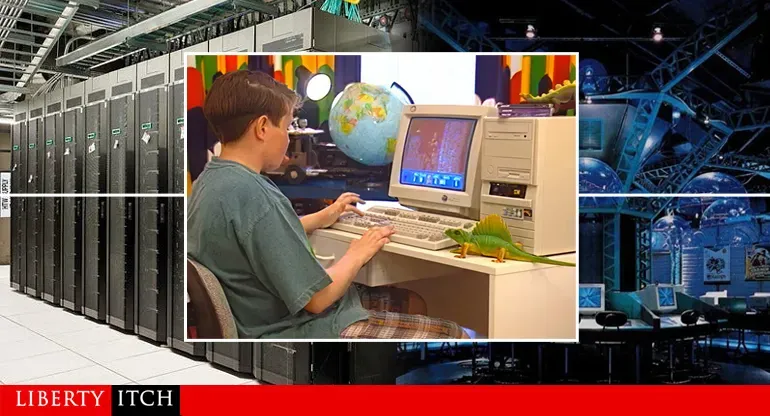Table of Contents
A mother writing for the Epoch Times asks the simple question: why are so many of the wealthy and elite leftist?
“Why are all successful people leftists?” said my daughter, challenging me with a smile.
“Not all of them. Those leftists are just very loud,” I replied. I knew she meant Mark Zuckerberg, Jack Dorsey, Jeff Bezos, Tim Cook, Bill Gates, and other powerful people who are trying to change the world according to their imagination.
However, it is true that a lot of ultra-wealthy are leftists. Why? I have to find the answer because many young people look up to them and believe that their beliefs are the truth.
[…]After reading quite a few insightful books, I learned that what is happening now is nothing new. Since the late 19th century, Western elites have been fascinated with communism and have supported its cause. In the pursuit of utopian ideals, traditional values have been trashed, America has been brought to the brink of socialism, and hundreds of millions of people around the world have been thrown to the bloodthirsty communist beast.
[…]Since the presidency of Woodrow Wilson, trade with the USSR had been promoted as a way to “mellow” the Bolsheviks and relax its totalitarian control. Obviously it did not work. The world was at the brink of a nuclear war between the Soviet Union and the United States during the Cold War. Nevertheless, this policy has lasted for more than 70 years. Why?
With the rapid development of science and technology since the 18th century, people started to drift away from belief in God, and believe that humans can take care of everything. With certain arrangements or planning, some people thought, humankind could get rid of all their sufferings and build a paradise on earth. Different socialist and communist thoughts mushroomed.
[…]By the early 20th century, socialist ideas had conquered the mind of those at the top of the financial, industrial, academic, and political realms. The elites never see communism as an enemy due to similar utopian obsessions. Instead, communist radicals were considered a force they could harness, like a wrecking ball, on their way to tear down old structures and build a new world.
[…]To understand better the relationship between elites and communists, we have to set aside the influence of Karl Marx.
Marx used simplified categories to characterize people, and make every relationship a class struggle. To him, the bourgeoisie (capitalists) and proletarians (working-class people) are innate enemies, like day and night or black and white. This is quite misleading. Not all proletarians are the same, and not all capitalists are the same. Most capitalists compete honestly in the market, while a small number of them, the monopolists, “go political” and “make society work for them,” according to Sutton.
[…]In an economic sense, we can see a common characteristic between elites and communist radicals. They both want to get something for nothing through political control, either by robbing and killing to take other people’s property or by using political means to gain huge wealth through monopoly.
In other words, although gaining their success in free societies, the elites prefer political systems with tight government control, be it Soviet socialism or national socialist regimes—like Nazi Germany or the current Chinese communist party (CCP) regime—because totalitarian nations have something unavailable in liberal democracies: mighty powerbrokers the elites can ally with to gain monopoly.
[…]Time flies. In the 21st century, huge asset management companies seem to be more powerful than the hereditary banking dynasties. The recently wealthy technology company leaders overshadow CEOs of Ford or General Motors. People change. Companies change. But the leftist ideology that many of them embrace remains the same, thanks to a century of brainwashing through education and media.
[…]The rising power of the Chinese communist regime is the driving force to replace the current rule-based world order built upon liberal democracy. The prestigious World Economic Forum (WEF) has talked about the necessity of change for years. While admiring the “spectacular rise of China,” it dismissed democracies as “lack[ing] the incentive systems to address higher-order and longer-term imperatives.”
You may ask, why do the elites push for the Great Reset? How would they benefit from it?
Remember, when the world order is revamped, old structures will be dismantled, new industries will be established, and new markets will be explored. Those with ties to the higher echelons of power have ample opportunity to profit handsomely from the process, though countless others will fall between the cracks in the restructuring, such as the Keystone XL pipeline workers.
The scary part is, it is no longer a dream, but something ready to be forced down everyone’s throat. With a new standard proposed by the WEF—environmental, social, and governance (ESG) metrics, powerful investment funds in Wall Street are using their leverage to force Western public companies to conform to their values. Soukup captured its essence brilliantly:
“Why, the utopian investor asks, should we measure the success of a company exclusively in terms of the number of smartphones it sells every quarter, multiplied by the cost of a smartphone, minus the costs associated with making and distributing those smartphones? Why shouldn’t we define success to include our beliefs and our values? Why shouldn’t we add another variable to the equation, one that measures the “footprint” associated with the manufacture and distribution of the smartphones? Why shouldn’t we demand—given the power our control of capital grants us—that our values be reflected in the investment of that capital? Why shouldn’t we insist that our values—religious in nature and unpopular in the voting booths—be the standard for participation in our system?
That, in a nutshell, is the ESG movement …”
For young people who hold the same leftist belief and values, if you are moved to tears by the promises the elites made, think twice. They don’t mean it.
[…]The leftists usually measure others with the moral standard they define. They sneer at conservatives for their clinging to God, guns, and the Constitution. In reality, they are not very serious about their own “moral standard.”
Tim Cook, CEO of Apple Inc., is an ardent advocate for “racial justice and equality.” However, according to a New York Times report on Nov. 30, 2020, Apple is one of a few multinational companies that lobbied to weaken the Uyghur Forced Labor Prevention Act. Uyghur Muslims in China are suffering genocide by the CCP, according to the State Department. Apple is one of 82 companies that potentially benefited from Uyghur forced labor, according to the Australian Strategic Policy Institute’s March 2020 report. In addition, the cobalt used in the batteries of Apple products are mainly mined from the Democratic Republic of Congo which uses child labor.
As for Mark Zuckerberg of Facebook and Jack Dorsey of Twitter who have been so harsh to President Trump and so “righteous” to defend “social justice,” they dare not raise an eyebrow toward Secretary General Xi Jinping of the CCP. In fact, in order to please the CCP regime and gain access to the vast Chinese market, Zuckerberg jogged in smoggy Tiananmen Square, had a pleasant meeting with CCP’s propaganda chief Liu Yunshan, and approached Xi Jinping personally to ask him to name his unborn child.
[…]Hollywood Studios and companies set themselves up as the leftist standard bearer and orchestrate all kinds of protests against conservative legislation. However, they are happy to follow any demands of the CCP in order to enter the Chinese market. The Walt Disney Company did not mind working with the propaganda departments and public security bureau in Xinjiang province, the region where Uighurs are detained, tortured, and enslaved, for its movie Mulan.
In my own observation while many wealthy and elite are leftist, most of them, if not all, didn’t actually earn their wealth, or got wealthy and continued to remain wealthy though exploitation. A purely hypothetical example would be someone setting up a large chain of stores selling cheap Chinese products that puts local Mom-and-Pop shops out of business.
A real life example is Amazon, who are are known for exploiting their workers.
Another real life example is Bill Gates, born into an already wealthy family, who got where he is today selling a sub-par operating system simply because someone else happened to be not at home when IBM called.
Meanwhile, Mark Zuckerberg got his fortune by selling other people’s personal information.
This, I think, results in a sense of guilt and combined with a sense of superiority, creates the typical leftist mindset of “We know best” and “We’re changing the world for the needy and the disenfranchised.”
In other words, they want to be seen as fighters for justice because they feel guilty for all of the crap they’ve done and because they believe, at an unconscious level, they don’t really deserve their wealth and position.
If you enjoyed this article please share it with others.









